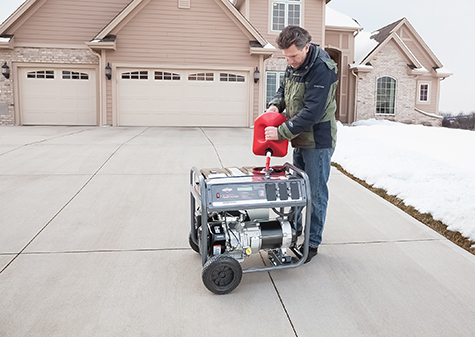Plan Ahead to Manage Winter Outages
Dec 18, 2016 02:33AM ● By Family Features
Ahead of the frigid winter weather blowing into cities and neighborhoods, families can take steps to prevent frozen pipes, spoiled food and the uncomfortable situations that arise when temperatures drop and a home’s power goes out.
Families that may endure a power outage this winter should remember these helpful tips to stay safe and comfortable.
Before the storm:
- Stock-up on batteries and flashlights.
- Evaluate the family’s non-perishable food supply and restock if necessary.
- Review how to manually open the electric garage door.
- Conduct a practice run to help ensure your family knows how to properly locate and operate any equipment required during the power outage.

During/after the storm:
- Never use a gas stove, oven or grill to heat a home.
- During the first few hours of the outage, keep the refrigerator and freezer closed. Snow can be used as ice to keep items cold in a cooler.
- Choose mittens over gloves and wear layered loose clothing to stay warm.
- Always operate a portable generator outside of a home.
Alternate energy source
A loss of electricity poses one of the greatest potential dangers and inconveniences when a winter storm strikes.
“Having a backup power solution ready ahead of a utility power outage prevents most of the headaches that go with living without power. With backup power, families won’t necessarily need to worry about perishable foods going bad, for example,” said Dan Roche, director of marketing for portable power and cleaning systems at Briggs & Stratton. “This gives families the security they desire to comfortably ride out long winter months.”
The most popular backup power solutions are portable generators and permanently-installed standby generator systems. Both types of backup power can keep a home’s lights, furnace and necessary appliances working in the event of a weather-related power outage or other emergency. Understanding the differences and capabilities between the two options can make selecting the best generator for a family’s needs much easier.
Portable generators are generally low maintenance, compact and easily maneuverable on the property. These units are typically powered by gasoline and can work well as a quick solution during a power outage to provide reliable electricity to a few essential items and appliances such as a refrigerator, basic light circuits and portable electric heaters at the same time.
While portable generators can provide users with flexibility and comfort, they need to be used appropriately at all times in order to avoid carbon monoxide poisoning. Never run a portable generator inside a home or in a garage. Visit TakeYourGeneratorOutside.com to learn more about portable generator safety.
Families who want a backup power source that offers uninterrupted power should opt for a home standby generator system. Home standby generators are permanently installed, so they need to be done by a professional. These generators are connected to a house’s existing propane or natural gas line. When utility power to a house is interrupted, the home generator automatically turns on within seconds. Home standby generators can power more of a home’s high-wattage appliances, like the furnace, electric water heater, stove and clothes dryer simultaneously, so your family doesn’t experience any interruptions during unexpected power outages.
For more backup power solutions and an interactive tool to aid in the decision-making process, visit briggsandstratton.com.
